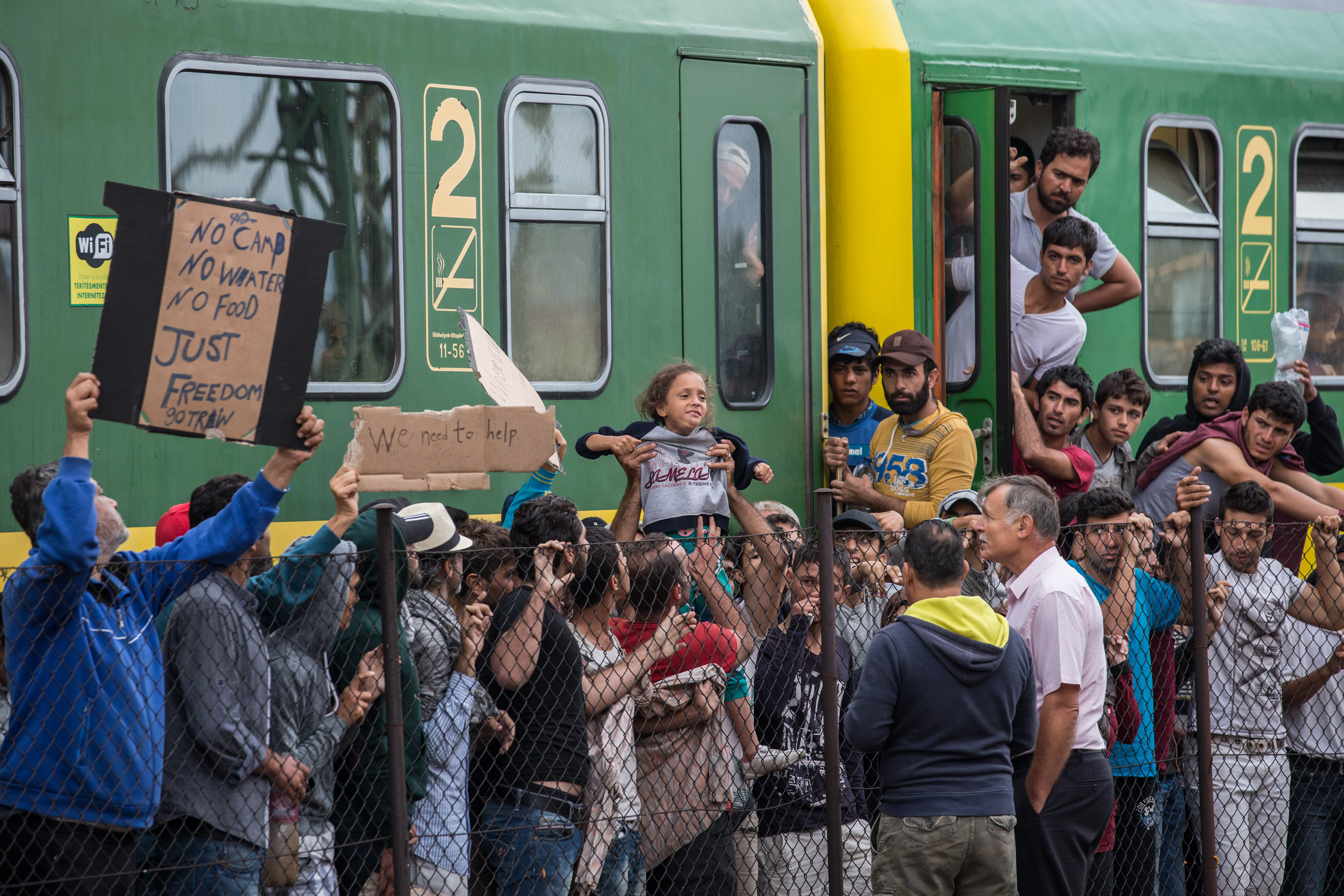Scenes from a European migrant crisis in Budapest


A free daily email with the biggest news stories of the day – and the best features from TheWeek.com
You are now subscribed
Your newsletter sign-up was successful
Keleti, the central international train station in Budapest, Hungary, has essentially turned into a refugee camp, with 3,000 refuges from Syria and other conflict areas camped out, trying to get to Germany and Austria but prevented from leaving by the Hungarian government. A train purportedly bound for Germany that left the station with hundreds of migrants on Thursday was stopped a short distance away, in Bicske, and surrounded by armed police who planned to escort the migrants to a nearby camp for Syrians and others seeking asylum. The passengers, some of whom bought tickets to Berlin or Austria, have refused to get off the train; they want to apply for asylum in Germany or Sweden or another wealthy country.
Hungarian Prime Minister Victor Orban has taken a hardline stand against refugees, building a fence to try to keep them out and saying on national radio Friday, "We have to make it clear that we can't allow everyone in, because if we allow everyone in, Europe is finished." As this video montage from the BBC shows, many of the Syrians that are fleeing now are middle class or even wealthy, reluctantly leaving their homes as Syrian President Bashar al-Assad bombs some areas indiscriminately, Islamic State captures more territory, and the economy goes into freefall. Lebanon and Jordan have reached their limits and are turning away refugees, The New York Times says, steering the wave of migrants to Europe. But on Friday, ground zero of the crisis is in Budapest. Here, from the BBC, are scenes of what that looks like. Peter Weber
A free daily email with the biggest news stories of the day – and the best features from TheWeek.com
The Week
Escape your echo chamber. Get the facts behind the news, plus analysis from multiple perspectives.

Sign up for The Week's Free Newsletters
From our morning news briefing to a weekly Good News Newsletter, get the best of The Week delivered directly to your inbox.
From our morning news briefing to a weekly Good News Newsletter, get the best of The Week delivered directly to your inbox.
Peter has worked as a news and culture writer and editor at The Week since the site's launch in 2008. He covers politics, world affairs, religion and cultural currents. His journalism career began as a copy editor at a financial newswire and has included editorial positions at The New York Times Magazine, Facts on File, and Oregon State University.
-
 How the FCC’s ‘equal time’ rule works
How the FCC’s ‘equal time’ rule worksIn the Spotlight The law is at the heart of the Colbert-CBS conflict
-
 What is the endgame in the DHS shutdown?
What is the endgame in the DHS shutdown?Today’s Big Question Democrats want to rein in ICE’s immigration crackdown
-
 ‘Poor time management isn’t just an inconvenience’
‘Poor time management isn’t just an inconvenience’Instant Opinion Opinion, comment and editorials of the day
-
 British warship repels 'largest Houthi attack to date' in the Red Sea
British warship repels 'largest Houthi attack to date' in the Red SeaSpeed read Western allies warn of military response to Iranian-backed Yemeni rebels if attacks on ships continue
-
 Houthi rebels claim Red Sea ship attacks
Houthi rebels claim Red Sea ship attacksspeed read Iran-backed Yemeni group vows to escalate aggression towards Israel-linked vessels in revenge for Gaza war
-
 Israel plans next phase of Gaza war as first hostages released
Israel plans next phase of Gaza war as first hostages releasedSpeed read After four-day ceasefire 'we will not stop' until destruction of Hamas, says Israel
-
 Mob storms Russian airport 'looking for Jews'
Mob storms Russian airport 'looking for Jews'Speed Read Plane from Israel surrounded by rioters chanting antisemitic slogans after landing in Russia's Dagestan region
-
 Tuberville's military promotions block is upending lives, combat readiness, 3 military branch chiefs say
Tuberville's military promotions block is upending lives, combat readiness, 3 military branch chiefs saySpeed Read
-
 Ukraine's counteroffensive is making incremental gains. Does it matter in the broader war?
Ukraine's counteroffensive is making incremental gains. Does it matter in the broader war?Speed Read
-
 US commissions first-ever Navy ship in a foreign port
US commissions first-ever Navy ship in a foreign portSpeed Read
-
 British spy chief, Wagner video suggest Prigozhin is alive and freely 'floating around'
British spy chief, Wagner video suggest Prigozhin is alive and freely 'floating around'Speed Read
